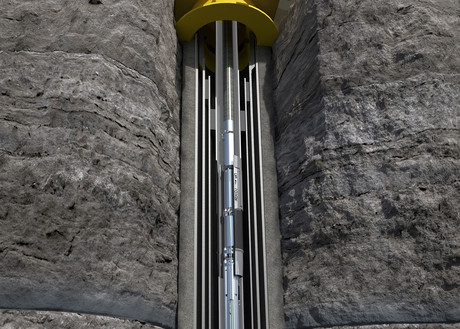Wireless well integrity monitoring system deployed in Norway

Emerson’s latest Roxar Downhole Sensor System has been deployed on the Maria field offshore Norway, providing field operator Wintershall with improved well integrity monitoring and offshore safety.
The latest deployment of the system — a wireless solution that delivers crucial integrity data and measures online and real-time pressure and temperature information from behind the casing in subsea production wells — follows the successful deployment of several dozen systems in other fields over the past four years, all providing crucial data to offshore operators on the status of their well barriers and casing.
The pressure and temperature monitoring system allows Wintershall to verify that the predicted pressure build-up falls within design criteria, and an alarm trigger point is implemented in case pressures that are potentially outside the system design are reached.
The Roxar Downhole Sensor System also comes with advances that enable operators to access online displays and trending of previously unreachable temperature and pressure subsurface data behind the well casing and achieve online integrity verification without any impact on production. The system, which has been tested at 225°C and can withstand pressures of up to 1380 bar, has already generated significant direct savings for operators, due to reduced testing requirements and more time to focus on production.
“After continued sales and further advances to the system, the Roxar Wireless Downhole Sensor Solution has reached full maturity,” said Sturle Haaland, European sales director at Emerson Automation Solutions. “The system and its track record prove yet again that Emerson has the willingness and capabilities to respond to customers’ specific demands and follow through with best-in-class technology and services to meet them. Operators will now have the information they need to make informed decisions on well integrity, adhere to regulatory requirements, ensure offshore safety and enable their wells to produce at optimal levels.”
The added knowledge on pressure and temperature dynamics delivered by the system’s quartz gauges in previously unreachable parts of the completion has also led to better understanding and confidence in operators’ well integrity strategies. The system ensures that wells meet integrity monitoring standards, such as API RP90 and NORSOK D-010. The system also has a Technology Readiness Level of TRL7 as per API RP 17N: Recommended Practices for Subsea Production System Reliability, Technical Risk and Integrity Management.
The system is powered using an inductive coupling system developed in-house with no need for batteries, making it suitable for harsh environments and the high-pressure and high-temperature surroundings often found offshore.
The sensor is installed externally to the steel casing and may be cemented in place in the well. Continuous power and data to and from the sensor is then transmitted wirelessly through the steel casing to ensure maximum well integrity for the life of the well and enable any anomalies to be detected early and in real time (something that would not be the case with periodic testing). The sensor system may be placed at any depth in the well completion system and has the capability to penetrate more than one set of steel casings.
SICK and Endress+Hauser launch strategic partnership
SICK and Endress+Hauser have announced they have completed the integration of SICK's gas...
SICK and Endress+Hauser sign strategic partnership
Companies to combine their process automation offerings at the turn of the year and establish a...
ABB flowmeters receive Ethernet-APL certification
ABB's VortexMaster FSV400 and SwirlMaster FSS400 flowmeters have received the company's...








